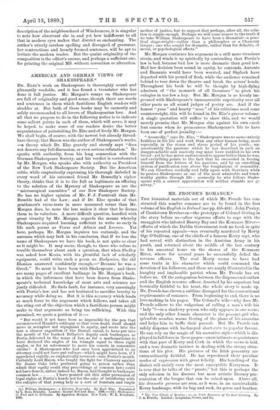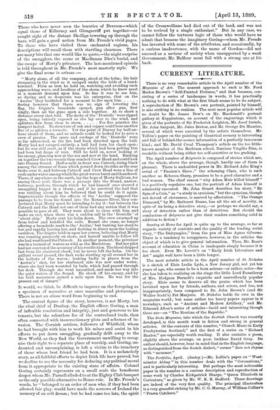MR. FROUDE'S ROMANCE.* THE historical materials out of which Mr.
Froude has con- structed this sombre romance are to be found in the first volume of his English in Ireland (see pp. 455-464). John Puxley, of Castletown Berehaven—the prototype of Colonel Goring in the story before us—after vigorous efforts to cope with the smugglers who infested Bantry Bay and the Kenmare River— efforts of which the Dublin Government took no heed, in spite of his repeated appeals—was eventually murdered by Morty Oge O'Sullivan, one of the chiefs of a famous Kerry sept, who had served with distinction in the Austrian Army in his youth, and returned about the middle of the last century to his ancestral home on the shores of the Kenmare River, where for several years he successfully defied the revenue officers. The real Morty seems to have had some traits in his character which could command the devotion of his followers, and these are amply illustrated in the haughty and implacable patriot whom Mr. Fronde has set before us. Of the antagonism between the dispossessed outlaw and the English revenue officer, deserted by his superiors but heroically faithful to his trust, the whole story is made up. Mr. Froude has shown a sublime disregard for the conventional requirements of romance. From beginning to end, there is no love-making in his pages. The Colonel's wife—why does Mr. Fronde adhere to the vulgarism of calling a man's wife his "lady "?—is a shadowy person who only appears in one scene, and the only other female character is the peasant-girl who, splendide niendax, warns Goring of the plans of his assassins and helps him to baffle their pursuit. But Mr. Fronde can safely dispense with hackneyed short-cuts to popular favour. He can rely on the magic of his narrative style—which is dis- played in full force in these pages—on an intimate acquaintance with that part of Kerry and Cork in which the scene is laid, and a true dramatic instinct in dealing with the strong situa- tions of his plot. His pictures of the Irish peasantry are extraordinarily faithful. He has reproduced their peculiar modes of expression with great felicity. His handling of the dialect will satisfy even the most susceptible Kerryman. It is true that he talks of the " praste," but this is perhaps the only solecism in his discreet but most artistic literary pre- sentation of the brogue that can be seized upon. Above all, his dramatis persona are seen, as it were, in an unmistakable Kerry landscape, with its bog and rock, its gorse and heather.
The Two Chiefs of Dunboy ; or, an Irish Romance of the Last Century. By J. A. Fronde. London: Longman, Green, and Co.
Those who have never seen the beauties of Derreen—which equal those of Killarney and Glengarriff put together—or
caught sight of the distant Skelligs towering up through the haze, will gain a good notion from Mr. Fronde's vivid pages. To those who have visited these enchanted regions, his descriptions will recall them with startling clearness. There are many bite that one would like to quote,—the night surprise of the smugglers, the scene at Macfinnan Dhn's burial, and the escape of Morty's privateer. The last-mentioned episode is told throughout in Mr. Fronde's most masterly style. We give the final scene in extents° :- " Morty alone, of all the company, stood at the helm ; his hair streaming in the wind as it escaped under the folds of a hand- kerchief. Firm as iron he held on, watching and avoiding each approaching wave, and heedless of the storm which he knew must in a. moment descend upon him. So fine it was to see him, so daring and so desperate was his enterprise, that on the
Aeolus' they hesitated for a moment to fire upon him Seeing however that there was no sign of lowering the flag, the frigate's broadside opened, gun after gun, first singly, then all the guns upon a side together. At so short a distance every shot told. The decks of the Doutelle ' were ripped open, being entirely exposed as she lay over to the wind, and
splinters flew from stem to stern For five minutes the tempest lasted. No structure of oak and copper could bear another five of so pitiless a tornado. Yet the point of Dursey lay half-an- hour ahead of them, and no miracle could be looked for to save a crew of pirates. The spars and cordage of the Doutelle ' were so far untouched, as the fire had been directed upon the hull. Morty had not escaped entirely, a ball had torn his cheek open ; but he was still erect, as if the storm which had been pelting him had been but drops of rain. Still he held on, never looking at his enemy, glancing now at the sea and now at the land. Rushing on together the two vessels thus reached Crow Head and could look into Dursey Sound. Half-a-mile in front was Catrock, rising black among the streams of foam which poured down its sides as the seas broke over it, and between Catrock and Crow Head were a line of reefs under water among which the great waves burst and thundered.
• There, if anywhere on the earth, lay the hope of Morty Sullivan, for among those reefs there was a passage into the Sound, narrow, tortuous, perilous, through which he had himself once steered a smuggling lugger in a storm ; and if he survived the hail that was rattling about him he believed that he could do it again. Impracticable though the officers of the `Aeolus' supposed the passage to be from the Sound into the Kenmare River, they con- jectured that Morty must be intending to try it : but between the Catrock and the Head not one of them had any notion that it was possible to pass at all. They were about to close with him and make an end, when there was a sudden call in the Doutelle ' of 'about ship.' Morty sent his helm down. The crew swarmed up from below and handled the sails. Round she came, no longer offering a broadside mark to the Aeolus,' but turning her stern to her and rapidly leaving her, and dashing in direct upon the boiling cauldron. The frigate held on upon her course, believing that Morty was running purposely on shore, and herself unable to follow till she had weathered the Catrock. In another moment, the privateer was in a turmoil of waters as wild as the Maelstrom. But her pilot had not overrated the accuracy of his recollection. The blood dripped fast from his shattered cheek, but he never left the helm. On the gallant vessel passed, the dark rocks starting up all around her in the hollows of the waves ; leaking badly in places from the Aeolus's ' shot, for her starboard side was now under water, where she had been wounded by balls which had passed through her deck. Through she went unscathed, and made her way into the quiet waters of the Sound. He shook off his enemy, and by his bold manoeuvre gained a mile upon him. He was for the present out of danger."
It would, we think, be difficult to improve on the foregoing as a specimen of narrative at once masculine and picturesque. There is not an otiose word from beginning to end.
The central figure of the story, however, is not Morty, but the rival chief of Dunboy, the English officer, Goring, a man of inflexible resolution and integrity, just and generous to his tenants, but the relentless foe of the contraband trade, then often connected with insurrectionary plots and schemes of in- vasion. The Cornish settlers, followers of Whitfield, whom he had brought with him to work his mines and assist in his efforts to put down smuggling, gradually drift away to the New World, as they find the Government unwilling to recog- nise their right to a separate place of worship, and Goring, un- daunted and uncomplaining, is left a victim to the treachery of those whose best friend he had been. It is a melancholy story, as all faithful efforts to depict Irish life have proved, but we decline to see the necessity for deducing any political moral from it appropriate to the existing state of affairs. Colonel Goring certainly represents on a small scale the beneficent despot whom Mr. Parnell alluded to at the Eighty Club banquet as the only possible alternative to Home-rule. In Mr. Fronde's words, he " belonged to an order of men who, if they had been allowed fair play, would have made the sorrows of Ireland the memory of an evil dream; but he had come too late, the spirit
of the Cromwellians had died out of the land, and was not to be revived by a single enthusiast." But in any case, we cannot follow the tortuous logic of those who would have us admit that because the imaginary Goring—whom Mr. Fronde has invested with some of the attributes, and occasionally, by a curious inadvertence, with the name of Gordon—did not succeed as a saviour of society when unsupported by a weak Government, Mr. Balfour must fail with a strong one at his back.



































 Previous page
Previous page